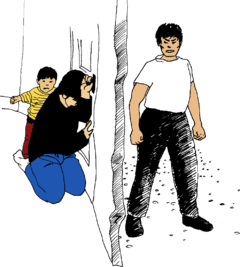Hesperian Health Guides
Managing stress and anger — COVID-19
Contents
Care for yourself
Keep your body healthy. Eat nutritious foods, move your body, drink plenty of water and sleep the hours you normally do, or more if you need to. Think about the things you will need and plan how to get them. Avoid drugs and alcohol — usually they create more problems than they solve.

Find ways to connect with others. Call or text family and friends. Talk with neighbors. Connect with others on social media and online networks. Don’t be shy about reaching out — everyone is feeling off-balance and isolated, just like you.
Take actions to manage stress. Too much stress is bad for you physically and can lead to a lack of patience, anger and violence. Create routines that lessen the stress for you and your family. Praying, meditating, and deep breathing can help. So can activities like singing and dancing, writing and drawing, and walking and exercising. You can do them alone or with others at least once a day, or more often if you can. See “Take breaks” for ideas about calming down and relaxing, and “Especially for men” for ideas about managing anger.
Seek help. Pay attention to your feelings and seek help when problems seem too much to handle. Talk to trusted friends or family, or call a hotline (for a mental health emergency) or a warmline (if not an emergency) to speak with a person immediately, get support when you need it, and find ways of coping. If you were a member of a support group before COVID-19, try to find ways to continue it — either by meeting outside, at a safe distance, or using technology.
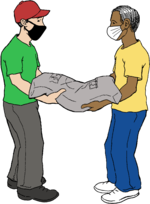
Limit your risks. You may have to go to work because you cannot live without income or because your job is considered “essential.” You may live in a crowded home or area, or have to shop in a crowded market. If you wear masks and other protective equipment, keep a safe distance from others, wash your hands with soap regularly, and make sure your boss organizes work safely, you will be doing the best you can to prevent you, your family and your neighbors from getting sick. Help others to make these changes too. When everyone works together to limit the spread of COVID-19, daily life can be much safer.
Caring for children
In quarantine, all childcare falls on parents or caregivers in the home, and usually that means women. Added to the housekeeping and other work women normally do, it is harder than ever to find the patience, humor, and compassion to provide children with love, support and guidance during this time, especially if one or both parents are also trying to work from home. Children, too, are struggling to cope with staying home. They miss their routines, friends, school and other activities. This can lead to anger, behavior problems, and conflicts in the household. While you can’t change the rules for quarantine, you can organize your childcare to reduce stress and conflict.
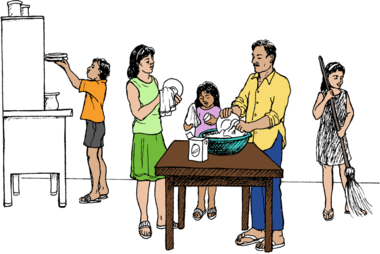
Divide childcare tasks among household members. Although it may take some effort, older children can help care for younger ones, and men without previous experience can learn to care for children. By sharing the work, everyone also gets an opportunity to take a break from caregiving and relax, however briefly.
Single mothers, unite! If only you are caring for your children, it is easy to become overwhelmed. Find another single parent, hopefully close by, and take turns looking after the children. So long as you both limit contact outside your families, wear masks, wash hands regularly, etc., this can be safe.
Help children find opportunities to connect and learn. With schools closed, parents have to take on a new role as teachers. Help children make time to do their lessons and homework, and help them be in touch with peers and loved ones. Set rules about how all household members will share internet access or phone time. To prevent people from taking advantage of children online, monitor their activity and who they contact. Remember that children also need to play and use their physical energy.

Take breaks and find moments to help you cope. It is exhausting to be an around-the-clock caregiver of children. If children are old enough to be left alone briefly, a 15-minute walk can improve your mood and restore your patience. Shorter breaks help too. When you feel yourself despairing, losing control or getting angry, stop: breathe in and out slowly 5 times before you speak or move. Or step outside or into an empty room for a minute or two to clear your mind before returning to the children. Even a crying baby can be left lying on his back in a safe place for 5 minutes while you calm yourself.
Especially for men

The problems caused by COVID-19 are not your fault. Men are often raised to feel responsible for the safety and economic well-being of their family. Losing work, crowded living spaces, or illness in the family can make you feel like you have failed as the head of your household and lead to depression or anger. But the pandemic is not your fault. Understanding that your problems are shared with others in your community, and finding ways to survive the crisis together can help. Getting help is necessary, not shameful.
You can find another way. Most of us continue to do things the same way we have always done them. But even if you do not know exactly how, you can begin to do things differently. You can gain control over your words and actions, and choose not to respond in anger again because you know it harms your family. When you feel anger, say to yourself, “Not this time. Not this time.” You can make yourself wait even just 10 seconds before reacting. You can give yourself the opportunity not to use violence.
Block your anger from developing. Often when something makes us angry or lose control, we feel it coming. How are you feeling right before you get angry? Does it happen at a certain time of day or after a specific activity? If you can notice how you feel physically before your anger takes over (for instance, if you are hungry or tired, drinking alcohol, etc.), you can work on preventing it from starting. If your anger explodes when you are hungry or tired, avoid it by eating something or getting some rest. If it is when you are drinking, begin to drink less. You can help those around you by looking after yourself.
Remember how it made you feel. Many of us grew up in families where men were violent. It can be difficult to learn not to recreate that same violent behavior in our own families. If you can remember the physical pain and emotional hurt that violence caused you, it can stop you from mistreating your family. If you can talk about it with family members or friends, hearing your own voice explain how you were hurt can help you remember to express your feelings without violence.
Help care for others
Each of us can help someone struggling through the quarantine or experiencing violence in the home.
Reach out by phone or text. It can be hard to ask for help. Call or send text messages that let people know you are there to listen and help in case they are hurting or need someone to talk with.. Help them connect with others who can check in with them regularly or help in an emergency.
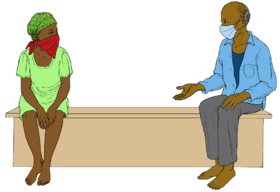
Learn to listen deeply to what the person is sharing so you can judge how serious their anxiety or depression may be. Much of the time just talking, finding something to laugh about, and encouraging the person to take a break will be a great help. But pay attention to anything that might signal a person is in immediate danger, including if there are weapons in the house, if they have been attacked, or if they might hurt themself or others. If it is a mental health emergency, or even if you are not sure how to help, call a hotline for advice.
Be a “sponsor.” Many people with alcohol problems find it useful to have someone they can call who will always answer and help them find the strength not to drink. A sponsor can also help someone find the strength not to lose their temper or to be violent, especially when the sponsor has also experienced those same problems.
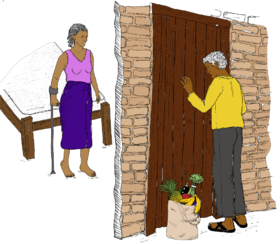
Help people get basic supplies and services. You can make sure people get the goods and services they need right now. Help people apply for government support, find food banks and community groups offering supplies, and assist with errands, shopping, communicating with others, or getting medical advice.
Do the research for them. Find out what resources are available in your community and keep that information at hand. Also post it in the community for people who need help but don’t ask for it.




